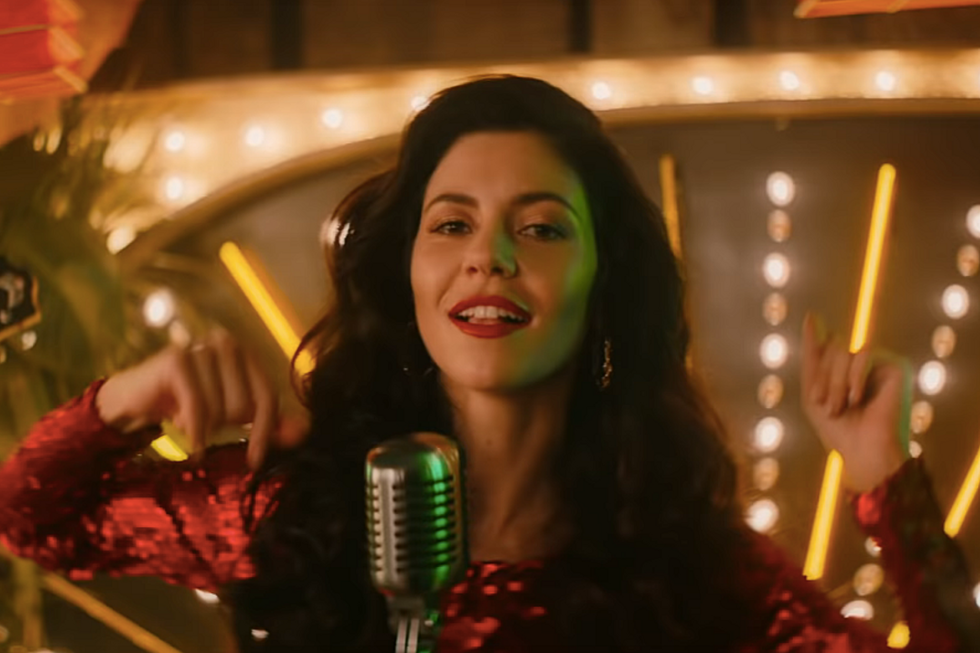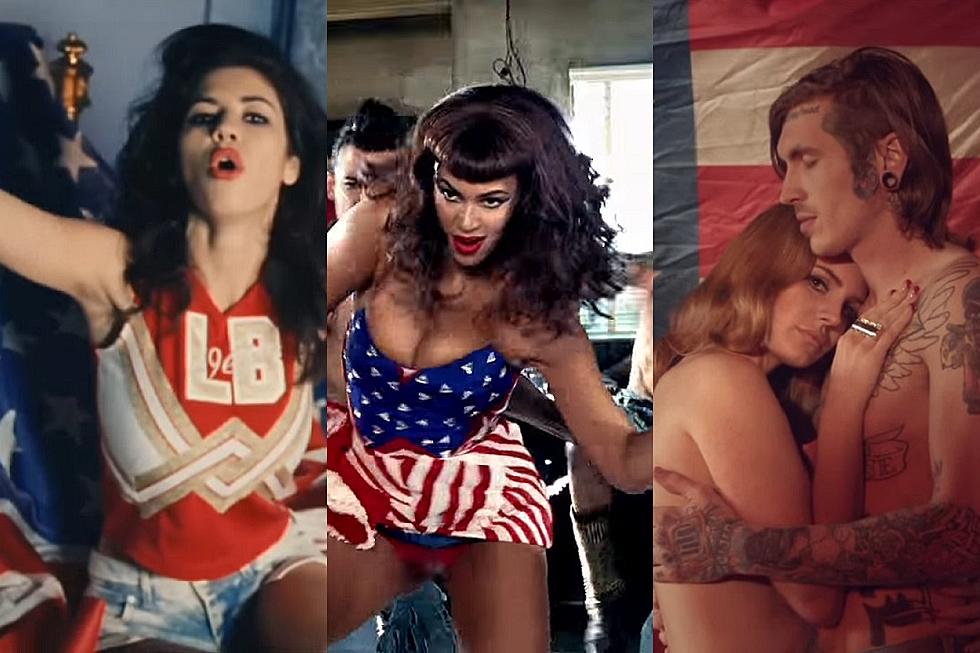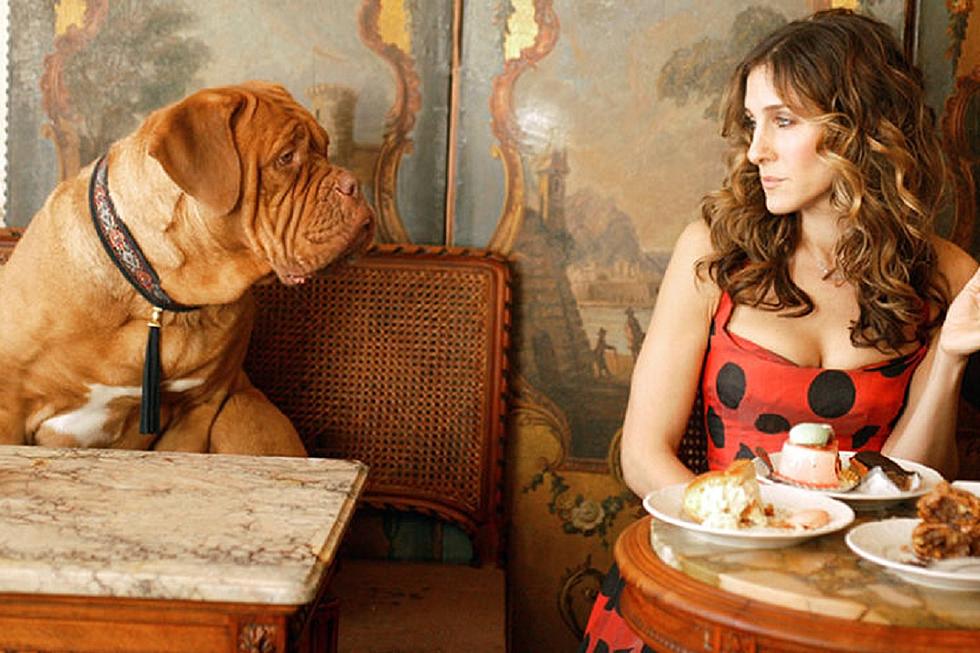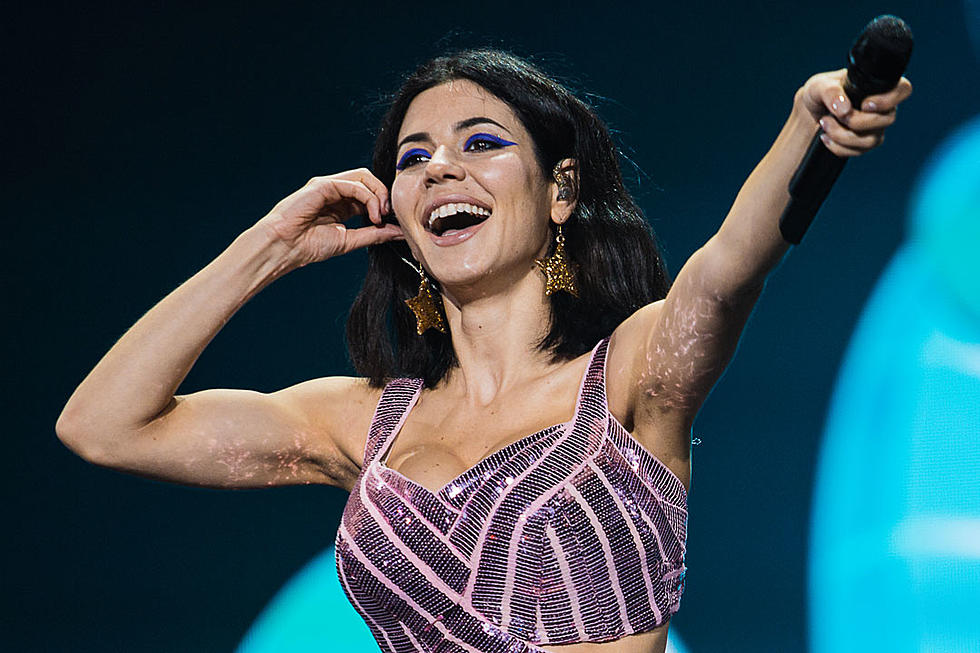
‘Electra Heart’ as an Allegory For the Pop Star Experience: Revisiting Marina and the Diamonds’ Sophomore Album
On April 27, 2012, Welsh artist Marina and the Diamonds dyed her hair bleach blonde, adopted the persona of a suburban housewife-cum-bubblegum pop star and released her critically polarizing, delightfully melodramatic sophomore album, Electra Heart.
The record was much different than her strange, off-kilter indie debut, 2010's The Family Jewels, which sounded like the sort of intensely avant-garde, poetic new wave record a feminist punk witch might listen to while attending a midsummer woodland rave. (Been there, done that.) Instead, Electra Heart was glossy, sugary and unabashedly catchy, possessing all the hallmarks of a quintessential would-be electro-pop smash.
Aesthetically, the music videos released for the record matched the new style, with lots of feminine, vintage motifs and nods to Hollywood pop culture camp. Promotional images included kitsch hearts, poodles, tiaras and pure, semi-psychotic Betty Draper-esque eye candy. She went out on the road, The Lonely Hearts Club Tour, for nearly a year, a show which visually and atmospherically evoked the dreamy space between The Virgin Suicides and a 1950's prom. It was deliciously irreverent, if not a bit superficial, and in fact that was the point.
In 2015, Marina officially murdered her musical alter-ego—with "sleeping pills," no less—telling The Guardian, "With Electra Heart, it did hinder me because the aim with that was to be a straight-up pop star. So when I was promoting it I realized, okay, this is why I don’t like being a pop star because people assume you don’t know anything and you don’t make your own music...It was fascinating but it made me think: 'I’m not going to do this again.'"
Purging the character out of her system was necessary: She had to make room for Froot, her third album which saw the songwriter return to her natural introspective roots. As she told Noisey that year, Froot was "effortlessly honest" and "easy to write." The record received critical acclaim.
Five years after Electra Heart's release, the album sits in a somewhat unfortunate place within Marina's discography—between the wholly unique, celebrated Family Jewels and the fan-adored, critically lauded Froot. However, what Electra was, and remains half a decade later, is a sharply clever satire of pop stardom and, I'd argue, an audio-visual allegory for the female pop star experience—the "rise and fall" and all.
Through the lens of lyrical interpretation, below, revisit Marina's sophomore album as an exploration of the journey a woman embarks on when entering the world of pop, from negotiating fan expectations and creative control hurdles to navigating the inherent sexism of the industry.
It's no secret that breaking the U.S. is a goal for many international artists seeking mainstream pop success ("I think I want your, your American tan / Oh, oh, oh / I think I’m gonna be my biggest fan!") and Electra Heart can be viewed as a slick commentary on the artist's perilous crossover voyage. The album opens with "Bubblegum Bitch," a frantic slice of bratty power-pop that sets the tone for the record while creating a firm sonic barrier between Electra and the artist's previous, more indie-leaning experimental pop. (You won't find a lick of the unhinged zaniness that made "Hermit the Frog" so eye-popping here.)
On the opener, Marina effectively lays out her mission with gleeful intent: She's gunning for pure mainstream pop superstardom, cost be damned. "Got a figure like a pin-up / Got a figure like a doll / Don't care if you think I'm dumb / I don't care at all," she shouts over a flurry of sugary electronics, abandoning The Family Jewels at the door. There's even a Britney Spears reference—yes, the ultimate Pop Princess archetype—as Marina coos, "Soda Pop, Soda Pop / Baby, here I come / Straight to number one..."
And there's also her first serious bid for Top 40 radio play: The infectious Dr.Luke-produced "Primadonna Girl" (what says "pop star" more than that?), which winks at the industry's insidious culture of idolization and frenzied fanfare, where pop stars are deified, shaped into totems of social worship, and in return play into the insatiable lust and mania of fans constantly begging, demanding for more.
"All I ever wanted was the world / I can't help but I need it all / ... Got you wrapped around my finger, babe / ... Would you do anything for me?" Marina yelps, betraying a desperate desire for fame. She's "living life like [she's] in a play," and that's because she is—Electra is her play-pretend character, the conduit through which we can experience celebrity for ourselves.
On her dance-pop single "How to Be a Heartbreaker," a post-album release single and another (disappointingly failed) effort towards U.S. radio impact, she continues exploring the idea of the faux pop persona and giving the fans what they want ("We'll get him falling for a stranger / A player, singing I lo-lo-love you!") and on the pulsating StarGate-produced house banger "Radioactive," she romanticizes the rush of performing onstage ("Waiting for the night fall, for my heart to light up / ...When you're around me I'm radioactive"), one of the hallmarks of a proper globetrotting pop star.
But where Electra Heart unapologetically celebrates pop stardom, it also lampoons its tumultuous relationship with the media and its oft-dismissed ranks within the froth of our entertainment culture. On the heartbreaking "Lies," Marina perhaps addresses the critical view of pop as a "guilty pleasure"—pop is music's dirty little word, after all—when she laments, "You only ever touch me in the dark / Only if we're drinking can you see my spark / And only in the evening could you give yourself to me..." Like a hipster DJ may "ironically" spin a nostalgic pop throwback at a party, she knows she's back on the shelf once the glitter fades.
Meanwhile, "Power & Control" can be read as a literal exploration of the constant struggle for power between artist and label: "Power and control / Give a little, get a lot / That’s just how you are with love... / Yeah, you may be good looking / But you’re not a piece of art." While an artist may purport to exert their perspective and artistic expression, with pop stardom comes the inevitable battle for creative control.
And in fact, speaking to InStyle in 2015, the artist hinted at legitimate creative control issues when she admitted, "I made a conscious effort to make a commercial pop album where I had creative control, but it’s quite difficult to do that when you’re working with big producers who follow the popular sounds of the time."
Marina continues to explore the pros and cons of fame on the somber "Starring Role," lamenting the emotional turmoil that comes with an artist's mentally-tolling odyssey to be noticed ("It almost feels like a joke to play out a part / When you are not the starring role in someone else's heart / You know I'd rather walk alone, than play a supporting role"), and she slams the "hypocritical, overly cynical" music critics—the "Hypocrates"—for wielding their reviews like the blade of a guillotine over her head ("You are the lonely one and only body in the world / Who can make me, who can break me down into a young girl... / Who are you to tell me...who to be...?").
The artist also touches upon the hypocrisy of slut-shaming pop stars in an industry where "sex sells" on the indignant "Sex Yeah," and the romantic "Teen Idle" can be viewed a subtle commentary on ageism ("the wasted years, the wasted youth...") as she wistfully recalls the idealistic virgin years of her youth, as women in music are often viciously relegated to the margins and stripped of their autonomous sex appeal once they hit the ripe age of 30—perhaps even younger. She grapples again with her independence as a musician on "Homewrecker," a galloping synth-pop metaphor for chasing fame while refusing to slacken the reigns on creative control: "And I don't belong to anyone," she declares. How many other pop stars feel the same? Probably many.
Here, we begin to witness her inevitable downfall: On her shimmering ode to Tinsel Town, "The State of Dreaming," the singer-songwriter-turned-pastel pop provocateur grapples with her aspirations for fame ("If I could sell my sorry soul, I would have it all," she decides), contemplating the consequences of abandoning integrity in order to achieve her dream. As "millions of girls float on their one quote, living on their last hope," Marina knows that all it takes to miss her one chance is a single misstep, so best to give the public what it wants... right?
Fame can be an isolating thing, a sentiment Marina doesn't shy away from. The outcast echoes of the Lonely Hearts Club, of which Electra is the leader, can be heard across the album, particularly on the dainty, swirling "Valley of the Dolls," an aptly-titled track inspired by Jacqueline Susann's 1966 novel of the same name, as well as the triumphant closing track, "Fear and Loathing," an aching trip-hop ballad in which the pop star ruminates on the complexities of navigating authenticity and the innate loneliness of stardom.
"Fear and Loathing" is pure pop opera, and the nucleus of the record: All celestial and angelic and quivering, Marina's voice floats like a satellite amid the shadowy, dramatic synths. "Got different people inside my head / I wonder which one that they like best," she ponders, a question we, the listeners, can answer for her—and one she ultimately answers for herself.
"And when the time comes along / And the lights run out / I know where I will belong / When they blow me out," Marina sings. Exit Electra, stage left... and the curtain comes down.
Marina and the Diamonds' Best Live Vocals:
Meet the Alt-Pop Girls of Music:
More From PopCrush









